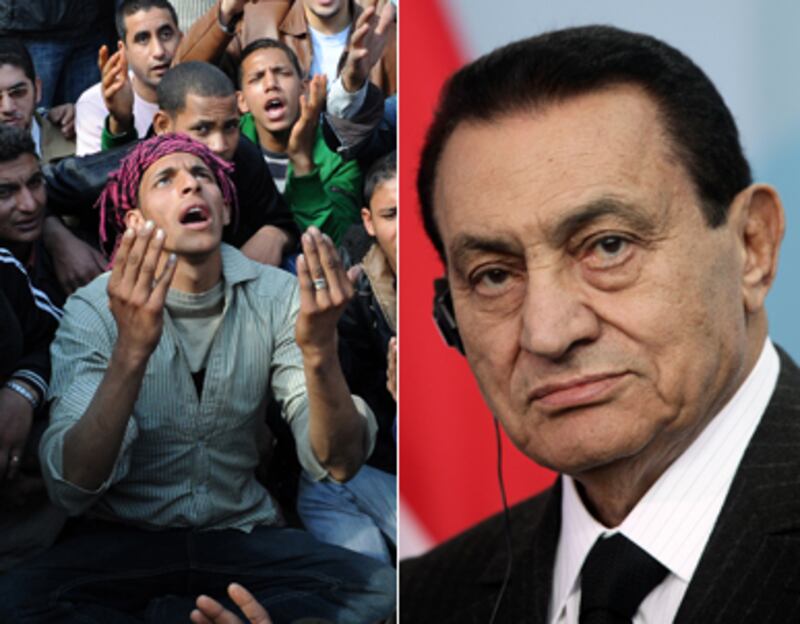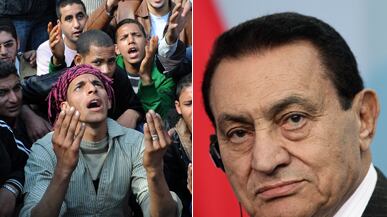Pundits and politicians shout “Better the devil you know!” as Egyptian dictator Hosni Mubarak’s regime nears collapse. Mubarak is hailed for not waging war on Israel, allowing some space for civil society, and permitting multi-candidate presidential elections. So why encourage his departure and risk the ascent of a theocratic, fundamentalist Muslim Brotherhood, which could be far worse?

The Egyptian dissidents and bloggers I’ve spoken to have little patience for this worldview. They have been tortured and imprisoned under Mubarak and refuse to accept that they must choose one brutal tyrant over another. They hold out the hope that they too can live in a normal country. After three decades of Mubarak, Egyptian dissidents feel it necessary to remind the world of his true legacy on human rights and democracy.
“Mubarak did not know the meaning of humanity,” said Bassem Samir, a democracy activist imprisoned under the dictator. “He did not know that they have rights. He worked for 30 years to ensure that Egyptians fear democracy. He weakened the opposition, and anyone who didn’t agree with him was out, out of everything—the media, work, and even the country. Whenever Mubarak thought someone else could be liked by the people, he removed them totally.”
ADVERTISEMENT
One of those the dictator effectively removed was the sociologist and democracy advocate Saad Eddin Ibrahim. The aging professor was imprisoned three times under Mubarak and can barely walk now as a result of his treatment in prison. “More people were executed during Mubarak’s reign than all of those executed for political reasons throughout the last 200 years,” Ibrahim said. “When he took over, there were 11 prisons in Egypt. Today there are 54. To put someone like myself or Kareem Amer in prison just shows how brutal and mean the regime is. We are secular, and all we are calling for is a defense of human rights and democracy.”
“My grandmother’s apartment is on top of a police station close to Tahrir Square, and when we would spend the night there we would regularly hear screams coming from the station,” said Dina Guirguis.
Few know the cruelty of Mubarak’s regime better than Amer, who spent the last four years in prison for criticizing the dictator and “insulting” Islam on his blog. When I asked him to describe Mubarak’s record, he said: “Many human-rights activists and journalists were imprisoned during his reign. Some were beaten and tortured. Others were abducted or disappeared without a trace. The most important of these incidents was the disappearance of the Egyptian journalist Reda Helal in the heart of Cairo in 2003. Many believe the security services were behind the abduction because of his political views.” Amer said the worst of Mubarak’s crimes have been committed in the past few days. “The security forces have used great violence against demonstrators,” he said. “They opened fire on them, killing scores.”
“I think the worst thing about Mubarak is that he never cared for anyone except himself,” said Egyptian blogger and poet Dalia Ziada. “He never listened to his people and what they really want. He was only responsive to his Western allies, especially the United States. It doesn’t matter how much people speak about human rights in Egypt and call for it. Only when America pressures him does he give more space and listens.”
Ziada points the finger directly at Mubarak for Egyptian state brutality. “Who is responsible for the murder of Khaled Said, the young innocent man in Alexandria?” she asked. “Who is responsible for wasting four of the best years of Kareem Amer’s life in jail only because he criticized him? Who killed Ayman Nour morally by imprisoning him only because he dared to challenge [Mubarak] in past presidential elections? It is Mubarak and no one else.” What was the personal cost of Mubarak’s dictatorship on Ziada? “It deprived me from pursuing my dreams for quality education, a respectable job, and good living standards. I, and so many people like me, could have lived in a much better state had we been in a democratic, liberal country.”
But didn’t Mubarak maintain peace and stability in the region for three decades? Many dissidents say no. Said Samir: “I think Mubarak is the main reason we don’t have good relations with Israel and real peace and normalization. All these years, he has profited from conflict.” Ibrahim echoed that thought: “Mubarak has been successful in deceiving a lot of people by posing as the bulwark against extremists, mainstay for the peace process, and a regional force for stability—none of which has really been borne out by fact. He has not advanced the peace process one inch beyond what President Sadat did back in 1981. He has not prevented or fought extremism in the region.”
Young Egyptians like Dina Guirguis, now a scholar at the Washington Institute for Near East Policy, are especially fed up with the regime. “For nearly 30 years, Mubarak has governed the country with an emergency law suspending basic constitutional protections, including the right against indefinite detention without charge,” she said. “Torture at the hands of Egypt’s brutal security apparatus became routinized, as did repression of all forms of political dissent. The regime has been complicit in the explosive growth of sectarian violence culminating in massacres of Egypt’s religious minorities, most notably the Copts.”
Guirguis recalled a personal anecdote that resonates particularly today. “My grandmother’s apartment is on top of a police station close to Tahrir Square, and when we would spend the night there we would regularly hear screams coming from the station,” she said. “They were screams of petty criminals being tortured by officers, because this kind of abuse of citizens was sanctioned.”
Kareem Amer, who spent four years in prison, confirmed that recollection. “During Mubarak’s rule, the incidents of torture in prison and security headquarters increased,” he said. “It became obvious that those arrested were tortured grotesquely to extract confessions. Other times, torture was used by officers simply to get revenge for their friends.”
Pundits living in the West may still be talking about the devil they know, but those whose lives have been shattered by three decades of a corrupt and brutal dictatorship find it much harder to do so.
David Keyes is the director of CyberDissidents.org.





